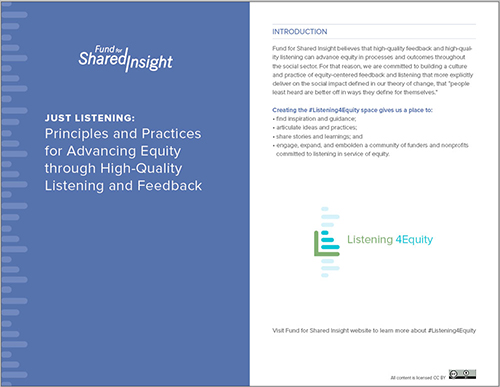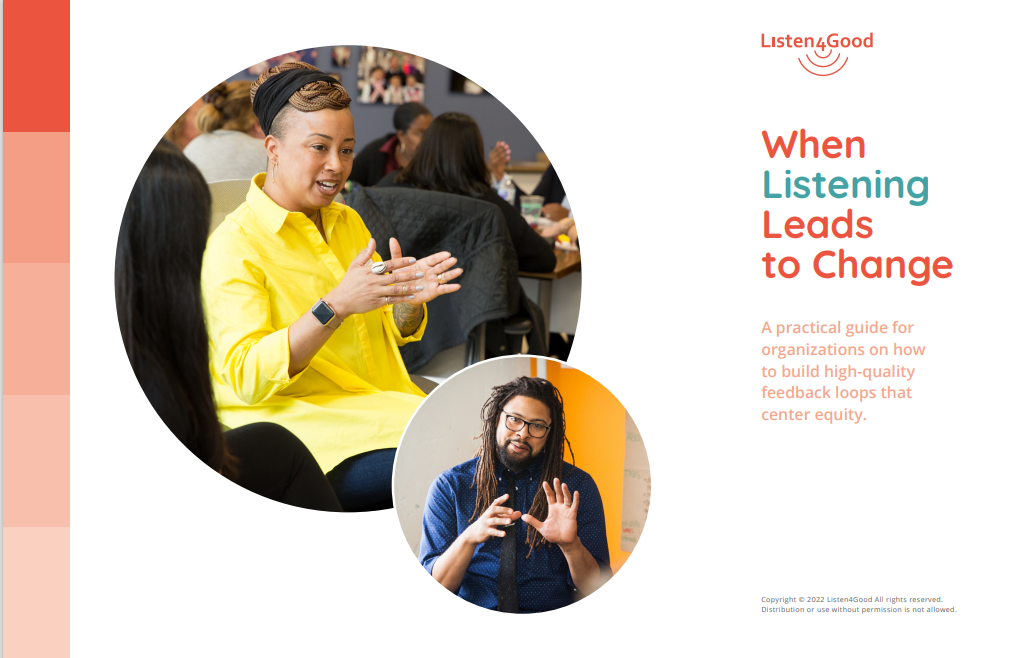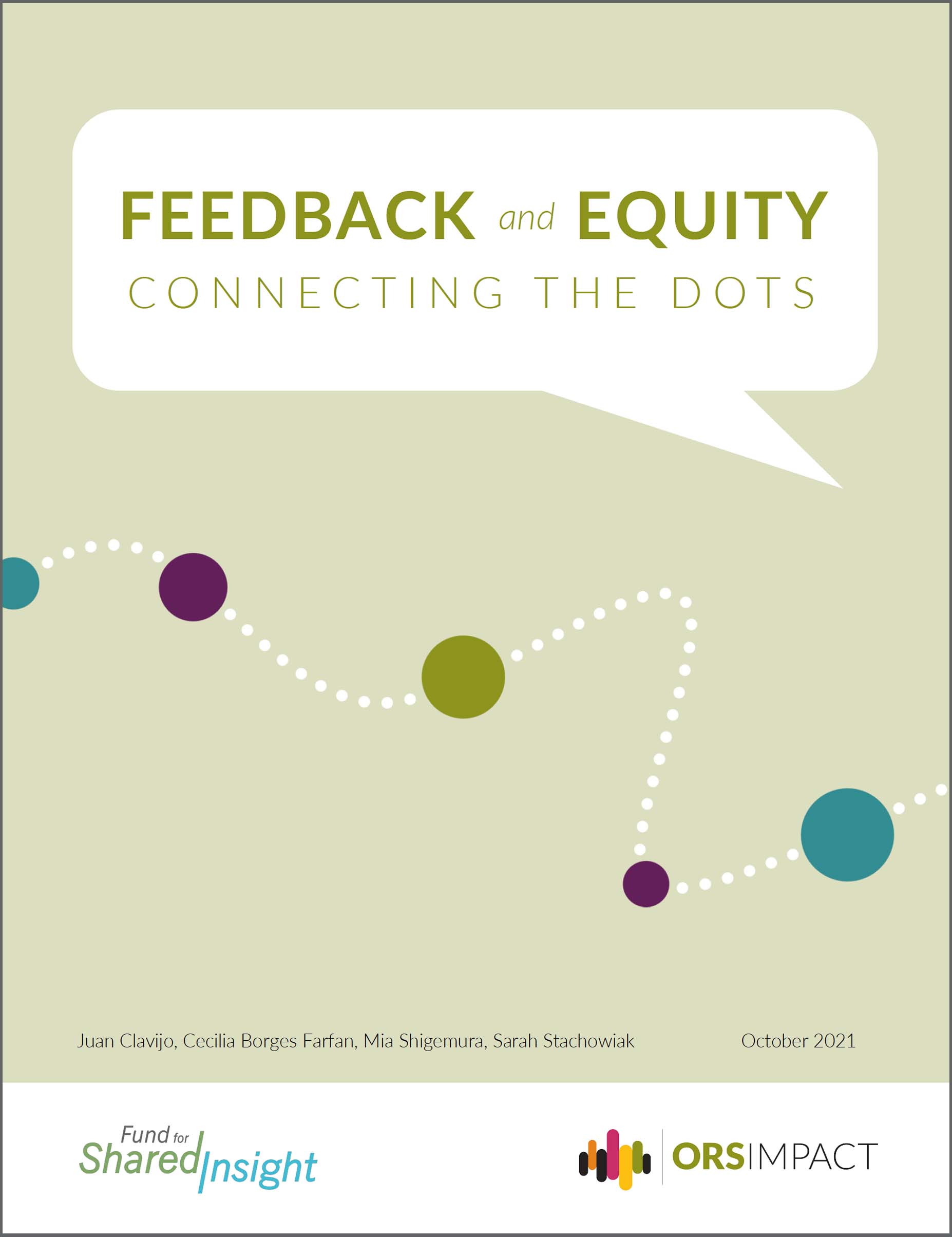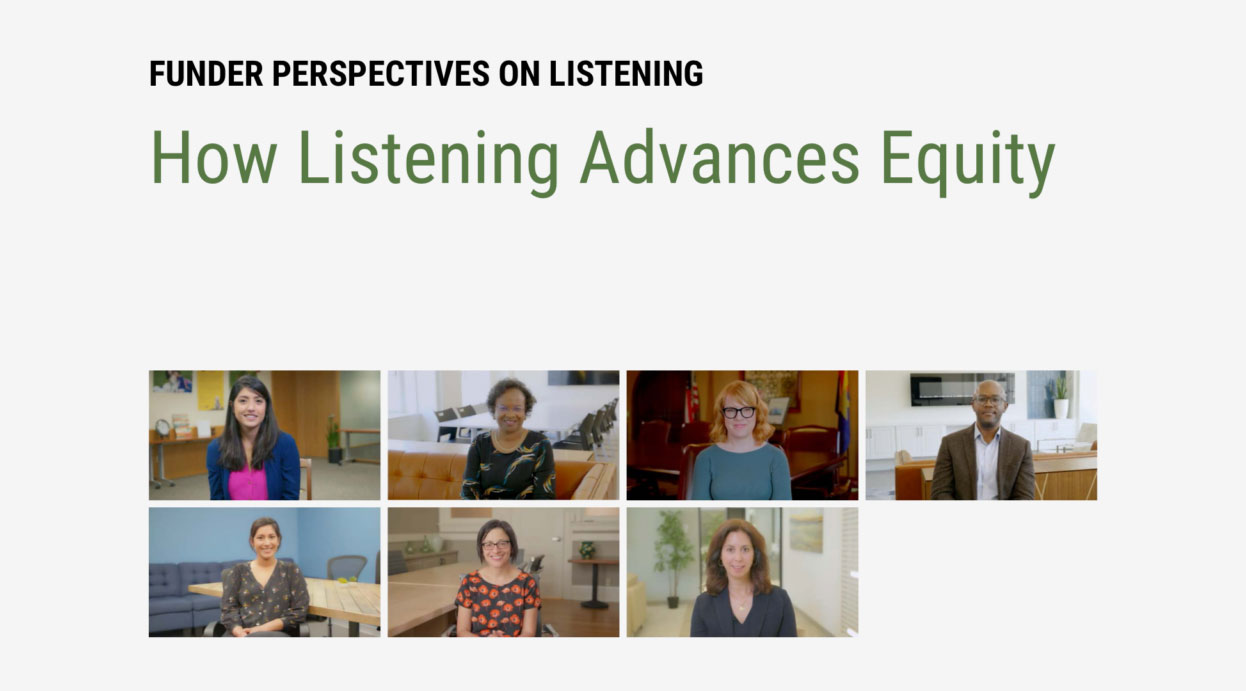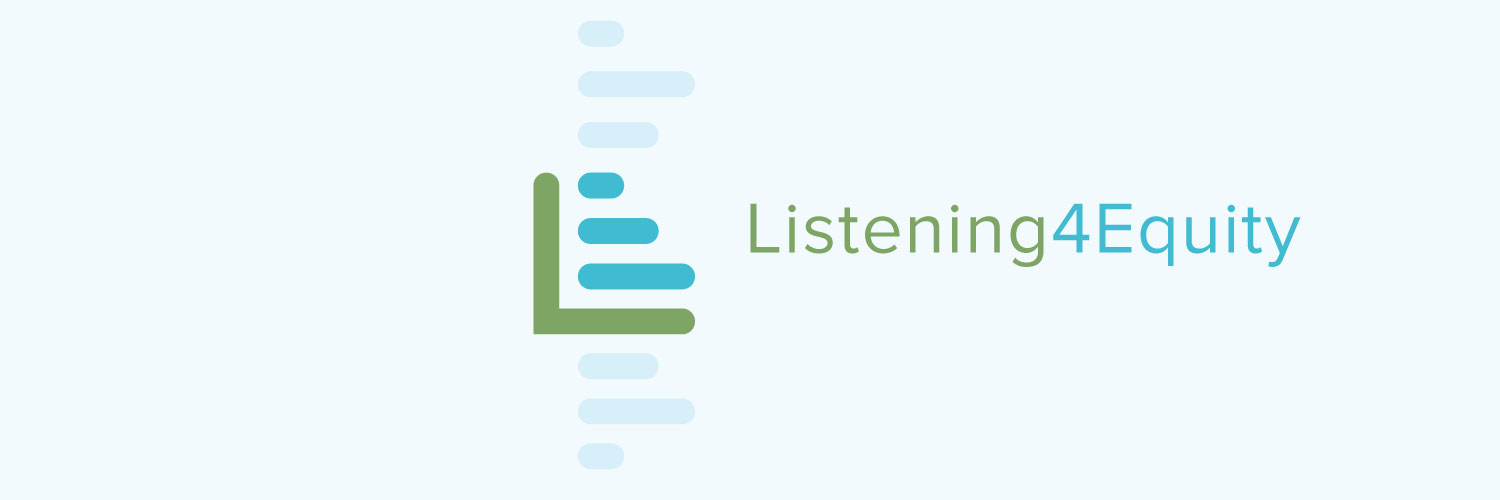
#Listening4Equity
Fund for Shared Insight believes in listening as a critical way to advance justice and equity in processes and outcomes throughout the social sector. For that reason, we are committed to building a culture and a practice of high-quality, equity-centered listening and feedback that more explicitly deliver on the social impact defined in our theory of change, that “those most impacted but often least consulted by philanthropy and nonprofits are better off in ways they define for themselves.”
Creating the #Listening4Equity space gives us a place to:
- find inspiration and guidance;
- articulate ideas and practices;
- share stories and learnings; and
- engage, expand, and embolden a community of funders and nonprofits committed to listening in service of equity.
Our Equity Principles
Shared Insight adopted a set of equity principles in July 2021, codifying a commitment to hold equity as an explicit and centered value, priority, and goal. We intend to look to the principles as a guidepost in all that we do, internally and externally. And we invite others to engage with the principles in their own listening efforts, not as a checklist or a standard for perfection, but as a tool for setting actionable goals and tracking meaningful progress on the journey toward equity and justice.
High-quality listening and feedback must be in service of equity to be high quality.
This means:
- There must be clear understanding of equity (i.e., distinct from diversity and inclusion, with an explicit focus on power and thus on race as a defining power structure) in both processes and outcomes.
- There must be some intentionality about driving toward equity. Because equity is not the norm, it is unlikely to be achieved by accident. Race- or power-neutral approaches actually exacerbate inequity; lack of bad intent is insufficient to counter structures that are designed for inequity. However, there is room to engage at various levels of skill and experience with equity.
- There must be continuous, disciplined practice – for example, engaging the full feedback loop, including and especially the final steps of responding to feedback and reporting back to the people who provided it – with equity lenses and actions embedded at each step.
High-quality listening and feedback in service of equity centers the voices and perspectives of people who have been most impacted and made “least heard” by structural racism and other systemic inequities.
This means:
- Believing that people are the experts of their own lives and that nonprofits and funders will make better decisions and help deliver better outcomes and more meaningful and durable impact by listening to people.
- De-centering the comfort and habits of funders and nonprofits and their definitions of effectiveness, progress, and success.
- Disrupting norms and “best practice” by amplifying voices from the “margins.” Common approaches to data analysis and evidence-based decision-making aim for the middle or averages, which will continue to keep the margins invisibilized and under-served and can actually widen gaps.
High-quality listening and feedback in service of equity not only lifts up ways to improve nonprofit programs and services but also positions nonprofit constituents to define for themselves what outcomes they want and what social progress looks like.
This means:
- Engaging constituents at all stages of organizational decision-making – whether about strategy, grantmaking or programs, or governance – and not only as inputs or recipients of information, but as designers, deciders, agents, and owners of those processes (and resourcing and compensating them for this).
- Revealing what constituents want and need for themselves, their families, and their communities and what nonprofits and funders should do to be ethical and effective partners.
- Exposing how power is operating and needs to be shifted, both inside the organization and in the larger context in which it sits.
High-quality listening and feedback in service of equity leverages larger changes inside nonprofit and philanthropic organizations and the broader society by building more meaningful and equitable connection between constituents, nonprofits, and funders.
This can manifest as:
- Explicit structures for people participating in programs and services to influence and make decisions about them (e.g., participant advisory boards, participants serving on governing board or other decision-making bodies, following the lead of community decision-making tables, regular reporting and accountability to constituents).
- Nonprofit practitioners and funders using the institutional and personal power they have to proactively close the power disparity with constituents from both ends – i.e., relinquishing their over-advantage and acting in ways that expand power for constituents.
- Nonprofit and philanthropic organizations becoming agents of equity and justice, no matter their mission.
Please read Shared Insight’s acknowledgments related to its journey around bringing forth its equity principles.
Fund for Shared Insight was created out of the belief that participant voice is a valid and essential source of data and form of measurement that is too often dismissed by the social sector. (For a deeper understanding of this view, please see an article by Fay Twersky and a paper by Valerie Threlfall.) With this as our background, our goal was to formulate equity principles that were informed and inspired by the people and communities most harmed by structural racism and other structural inequities but often least consulted by philanthropy.
We acknowledge that our vision and work are unfolding alongside, and in conjunction with other creative and cutting-edge work in the field, such as efforts around participatory grantmaking, trust-based philanthropy, community ownership, narrative change, and ethical storytelling. And that our journey has been propelled by new learnings drawn from our own participatory grantmaking efforts and our feedback initiative, Listen4Good. These programs are a part of our intentional evolution around centering equity in all we do.
We are especially grateful for the thought leadership and partnership of the Equitable Evaluation Initiative, which has challenged the field to consider multi-cultural validity and equity. (For more about the concepts of validity, please see an article by Jara Dean-Coffey.) Aligning with the Equitable Evaluation Framework™ was a critical driver in developing our equity principles.
Also key was hearing directly from people participating in nonprofit programs and services through Shared Insight’s library of videos and stories; the lived expertise of design team members participating in Shared Insight’s participatory grantmaking initiative; and interviews and evaluations conducted by Shared Insight’s learning partner, ORS Impact.
We are also grateful to the representatives of Shared Insight’s core funders who engaged in rigorous discussion about and engagement with these principles, as well as our peer philanthropy-serving organizations that participate in Shared Insight’s Funder Listening Community of Practice.
The Fund for Shared Insight committee overseeing the creation and application of these principles:
- Kate Belyi, Rita Allen Foundation
- Megan Brokenborough, Fund for Shared Insight
- Andrew Brower, W.K. Kellogg Foundation
- Gita Gulati-Partee, Fund for Shared Insight
- Nate Mandel, Center for Employment Opportunities and L4G feedback coach
- Ciciley Moore, W.K. Kellogg Foundation
- Rick Moyers, Fund for Shared Insight
- Rory Neuner, Barr Foundation
- Jennifer Chavez Rubio, Bill & Melinda Gates Foundation
- Melinda Tuan, Fund for Shared Insight
- Jehan Velji, William and Flora Hewlett Foundation
A Guide to Feedback Loops & Equity
Listen4Good, a feedback capacity-building program, provides direct-service organizations with tangible actions for centering equity through each phase of a feedback loop. The guide outlines principles that explicitly relate client feedback to equity and practices that can shift and share power within organizations and with those they serve.
Connecting the Dots
Our learning and evaluation partner, ORS Impact, interviewed organizations that participated in the feedback initiative Listen4Good, aiming to identify examples and patterns of feedback practices to help guide nonprofits and funders in what to look for, what to focus on, and how to create practices that advance equity. In one particularly illuminating section, the report describes different ways feedback and listening can contribute to equity work — as a catalyst, mirror, or compass.
Read about that and other key findings in “Feedback and Equity: Connecting the Dots.”
Featured Videos
This Is My Story
In this powerful video featuring the Center for Employment Opportunities (CEO), a national organization that works with people coming home from incarceration, we hear Kenneth, Wilfredo, and Patricia – members of CEO’s Participant Advocate Council — tell their own stories of transformation. And we see how high-quality feedback, listening, and storytelling can transform an organization and lead to positive social change.
Just Listening
Come along on Fund for Shared Insight’s equity, diversity, and inclusion journey, where funders are having the hard but essential conversations about what listening and feedback can mean for racial equity, power-sharing, and outcomes for the people and communities at the heart of philanthropy’s work.
How Listening Advances Equity
This two-minute video is the part of our “Funder Perspectives on Listening” series featuring honest talk about why high-quality listening and feedback can lead to improved philanthropy. Here, funders talk about how listening and feedback can promote equity if the right practices and lenses are applied.
After watching these short videos, read stories about #Listening4Equity and feedback in action at nonprofits and funders across the country.
#Listening4Equity, funder listening, Listen4Good, and other feedback stories
Fund for Shared Insight Equity, Diversity, and Inclusion Committee

Mareselle Alexander-Ozinkskas
William and Flora Hewlett Foundation

Kate Belyi
Rita Allen Foundation

Megan Brokenborough
Fund for Shared Insight

Andrew Brower
W.K. Kellogg Foundation
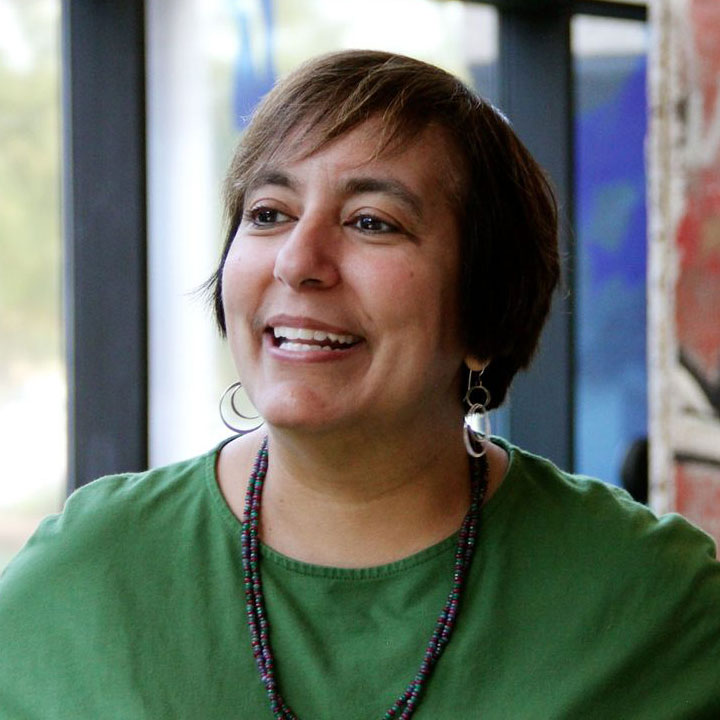
Gita Gulati-Partee
Fund for Shared Insight

Nate Mandel
Listen4Good

Rick Moyers
Fund for Shared Insight

Rory Neuner
Barr Foundation

Karla Ruiz
Sobrato Philanthropies

Doua Thor
Sobrato Philanthropies
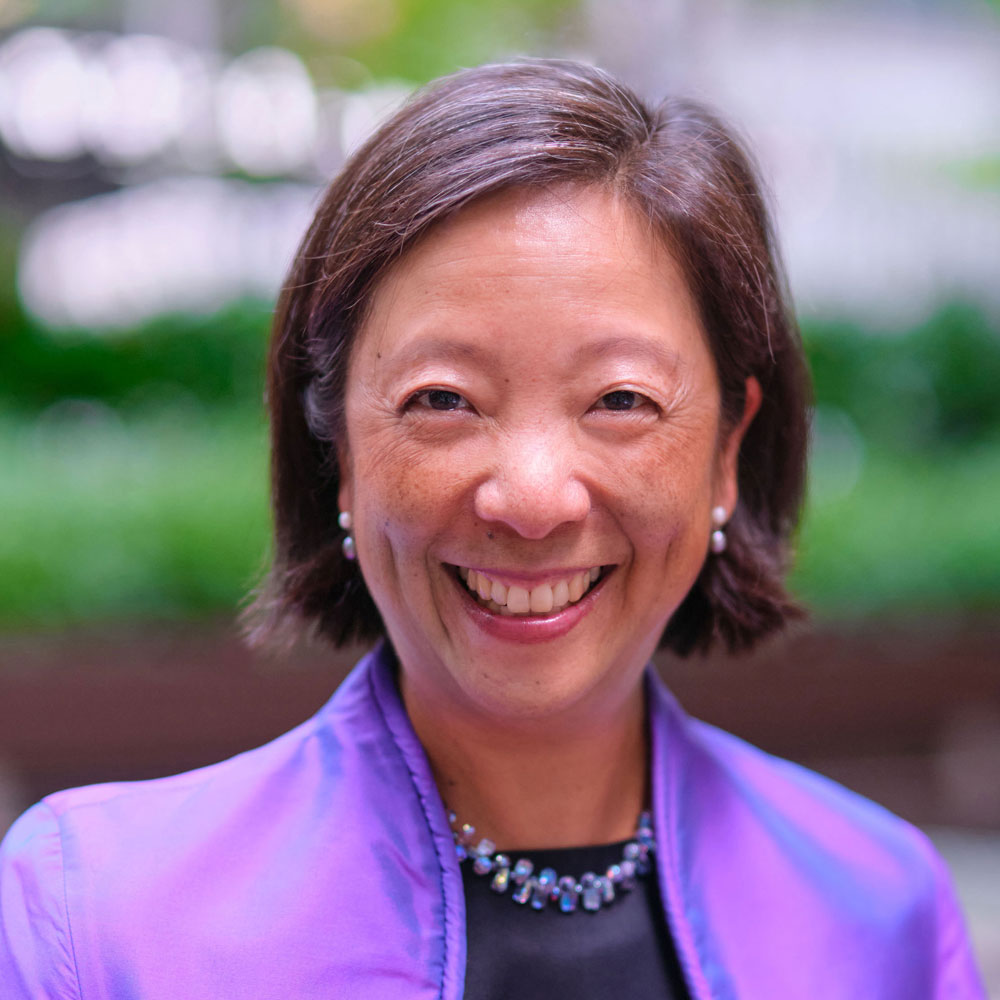
Melinda Tuan
Fund for Shared Insight
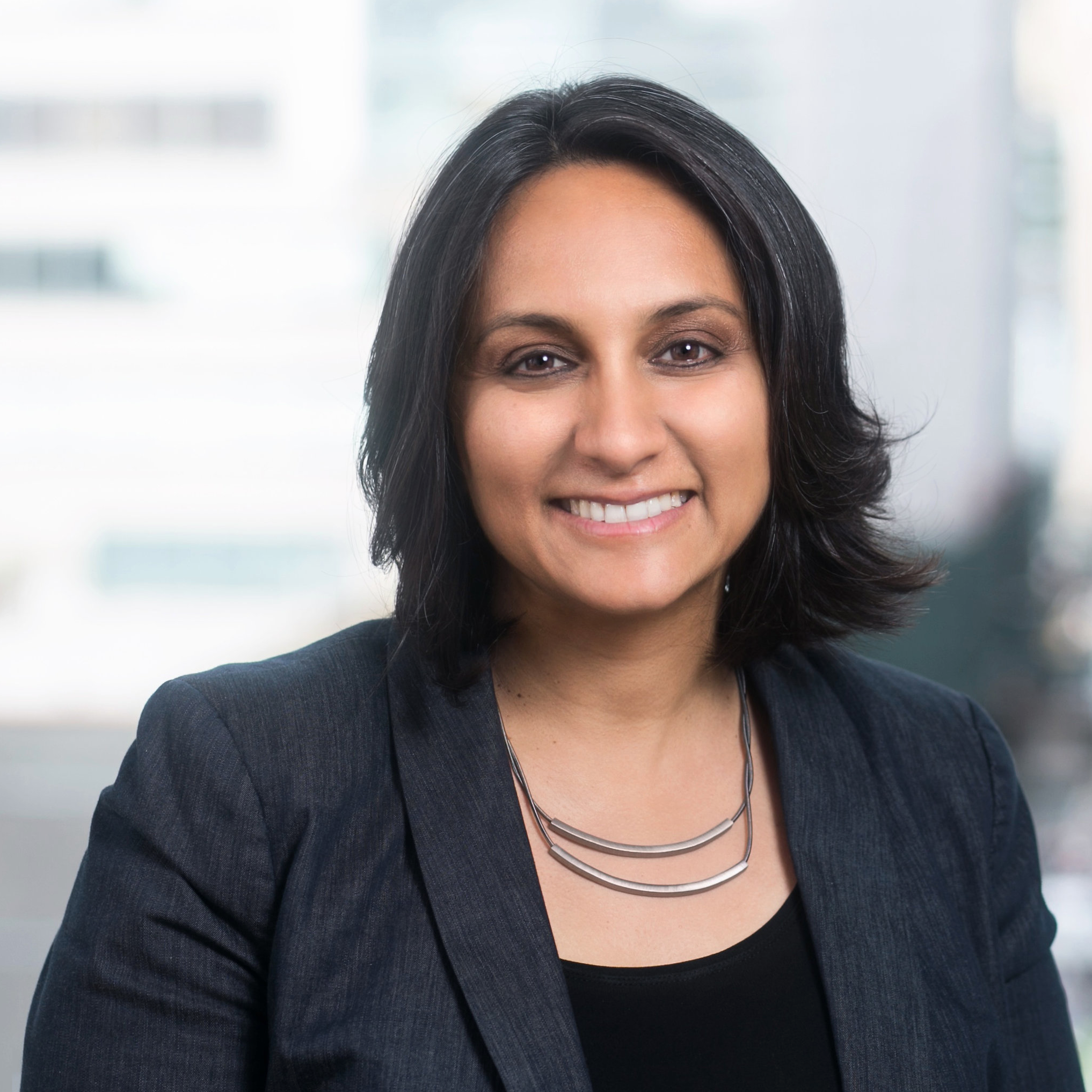
Jehan Velji
William and Flora Hewlett Foundation
